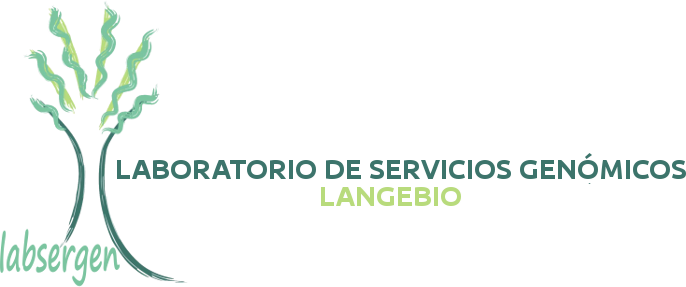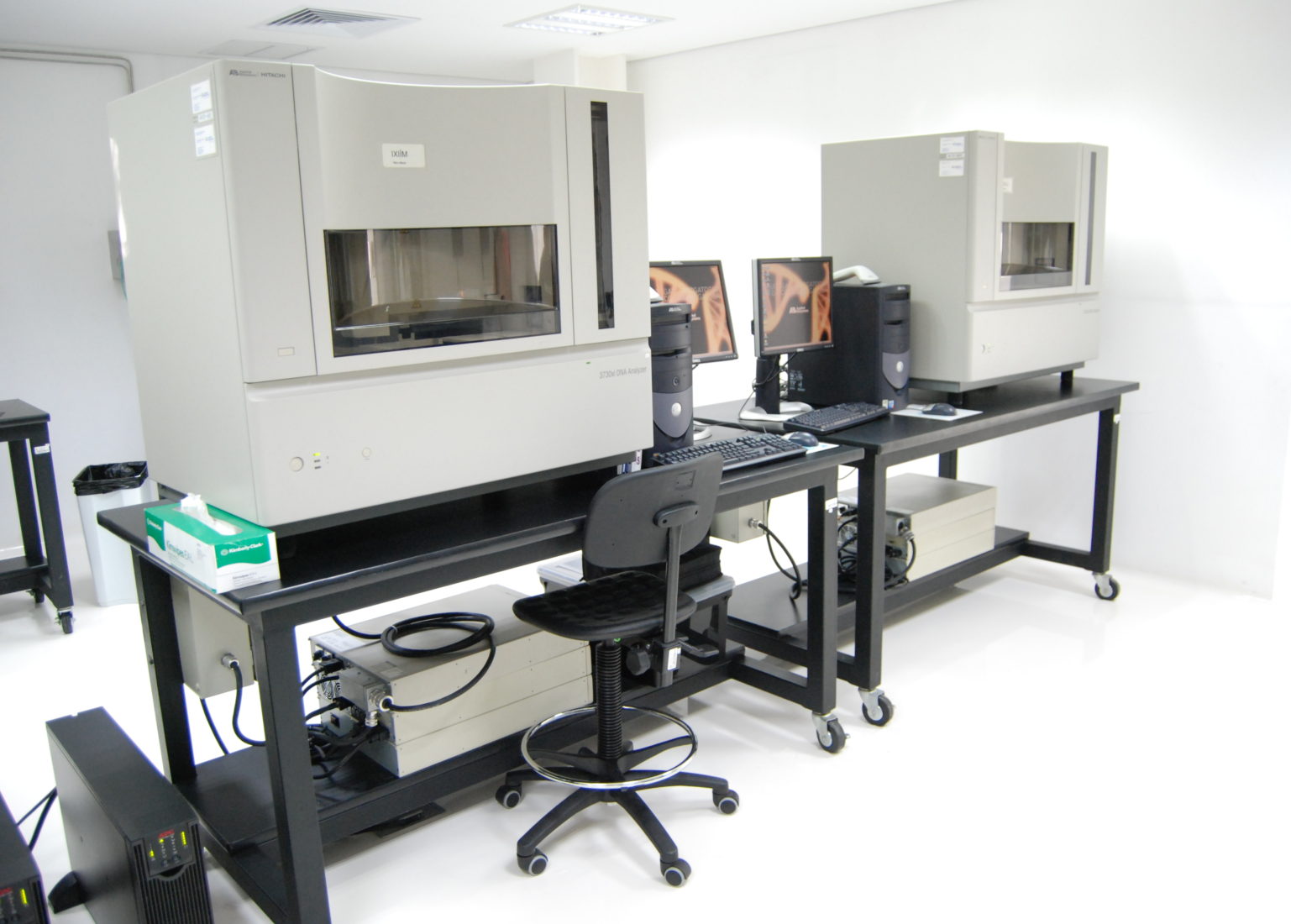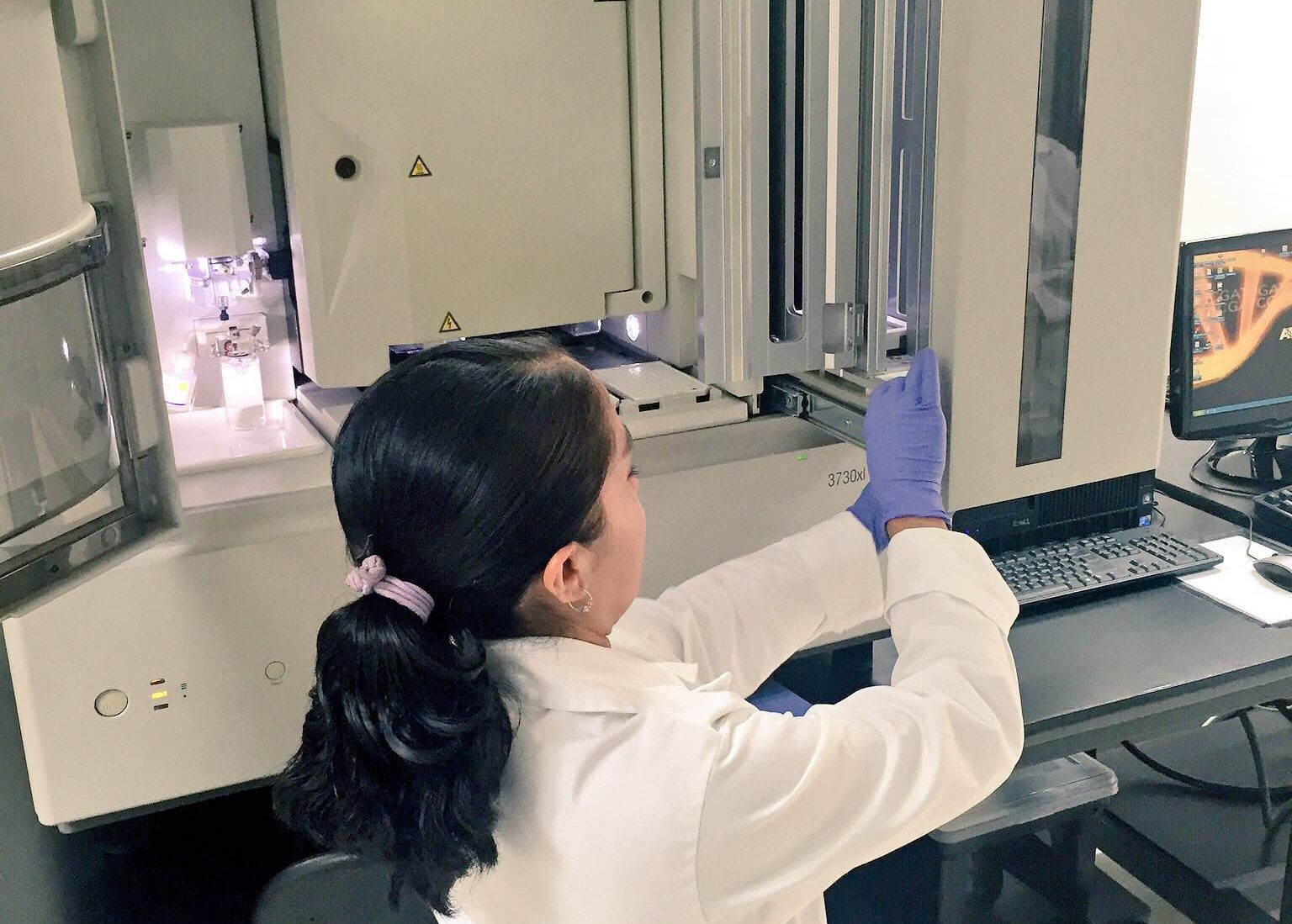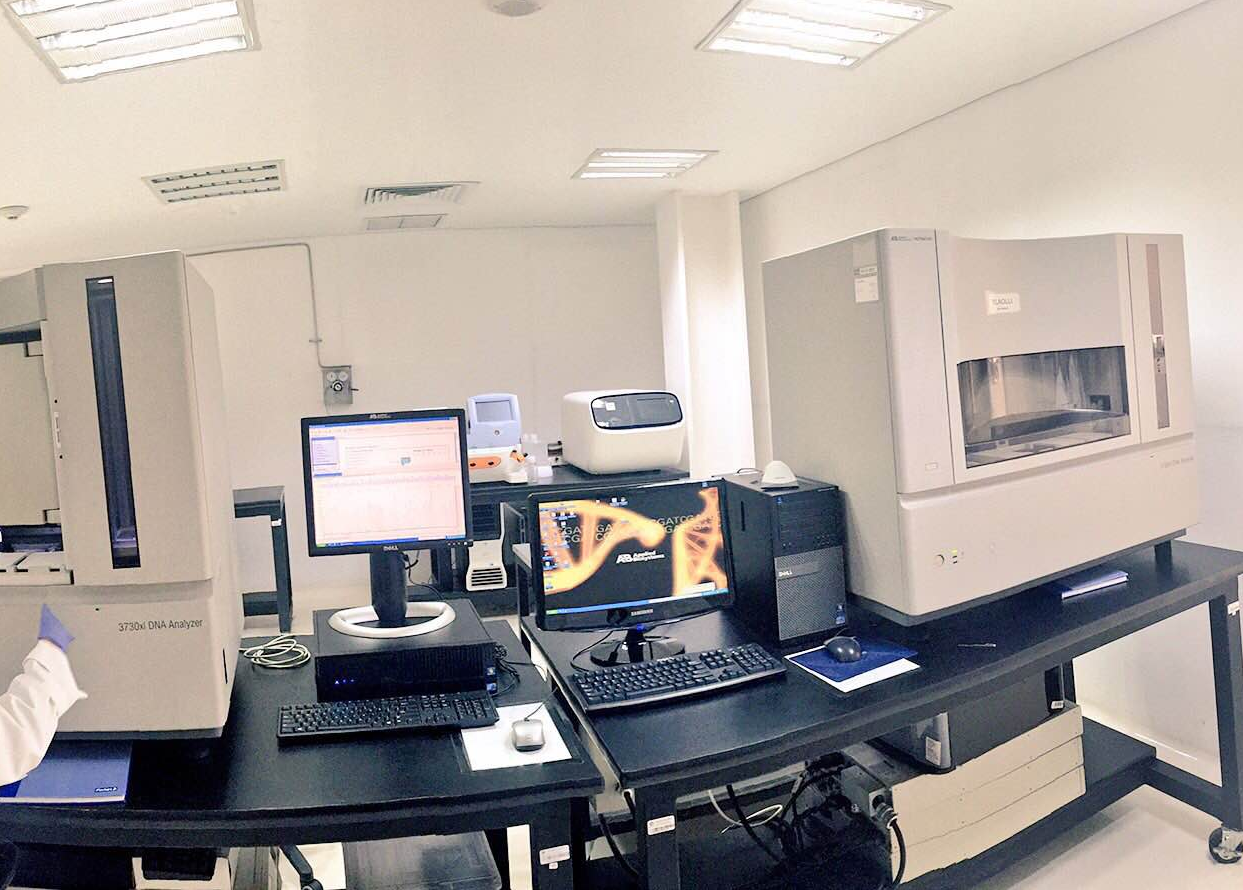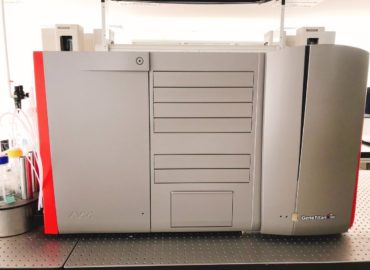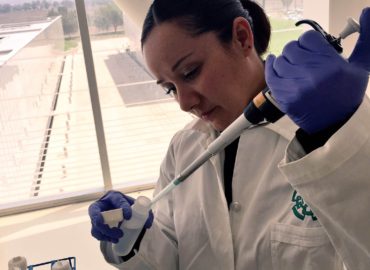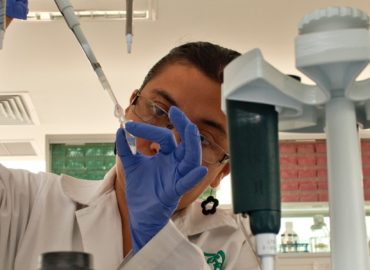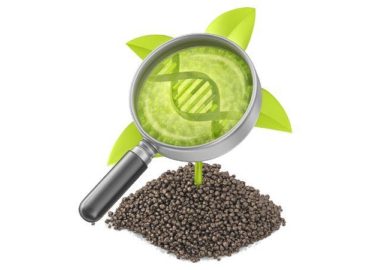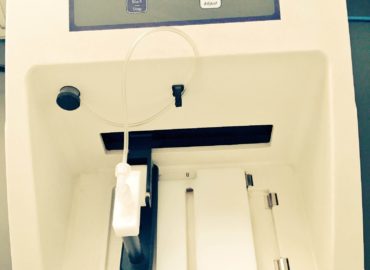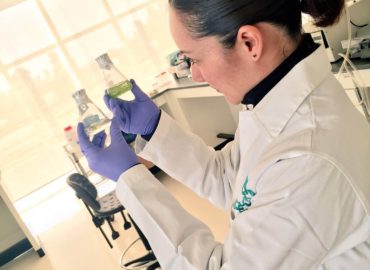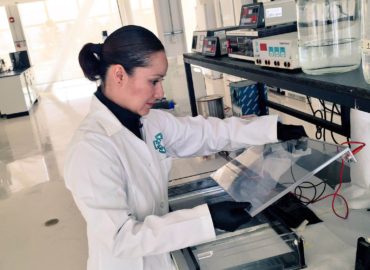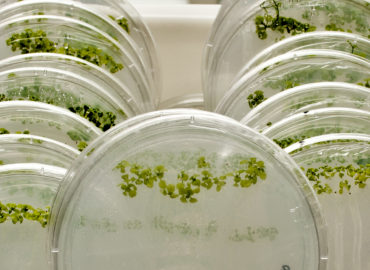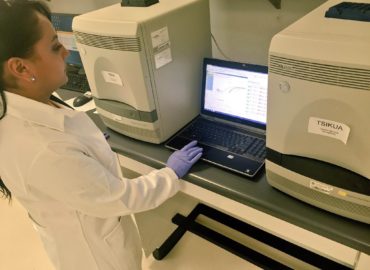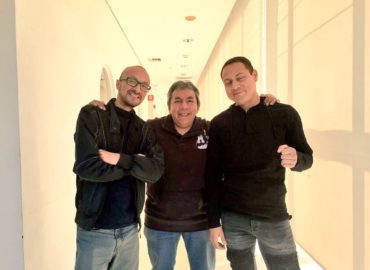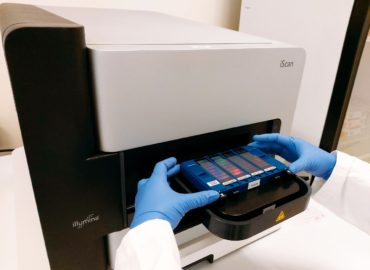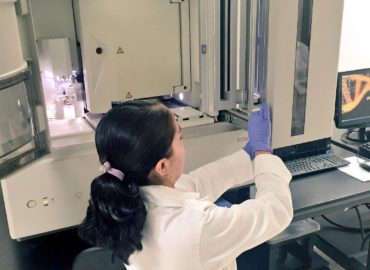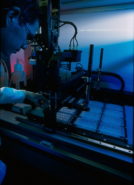Capillary DNA sequencing utilizes the Sanger method, based on the DNA polimerase ability to generate complimentary DNA strands of different sizes with the use of fluorescently
dideoxynucleotide triphosphates (ddNTPs) as DNA chain terminators.
Using Sanger's technique in automatized systems, it is possible to detect each of the ddNTPs that are added to the end of a DNA fragment. This fragment is separated from other fragments by electrophoresis and its sequence can be recovered with specific softwares.
DNA sequencing is done with the BigDye Terminator v3.1 technology and multicapillary DNA sequencing systems (AB3730).
LABSERGEN offers this sequencing service to the general public and to academia and industry.
Information about the service
- With standard or user-designed primers, sequencing of PCR products, plasmids, single stranded DNA, BACs, etc.
- The generated reads are 800 nucleotides long. The length of the sequence depends on the quality, integrity and sample concentration.
- Sanger sequencing allows the processing of a single sample, up to 96-384 samples in a slide.
- The results will be returned after 7 days upon receiving the sample(s), along with a service request. These results include the visualization, edition and quality control of the results.
Sample requirements
| Double stranded plasmids: | 200ng/ul (at least 8μl per reaction) |
| Single stranded DNA: | 50ng/ul (at least 8μl per reaction) |
| PCR products: | 100ng/ul (at least 8μl per reaction) |
| BACs | 600ng/ul. Depending on the size of the BAC. |
| Slide format | concentration depending on the product to be sequenced. |
- DNA must be free from RNA, phenol, salts, EDTA, proteins, detergents.
- PCR products should be free from subproducts, primers, dNTPs and salts.
- DNA should be lyophilised or suspended in water (10ul per reaction)
- Please indicate in the service request the type of vector, size of the insert and the sample concentration. The name of the sample and primer should be less than 8 characters and match the label in the tube.
- Samples with a concentration lower than stated will not be processed successfully.
- DNA must be free from RNA, phenol, salts, EDTA, proteins, detergents. PCA products should be free from subproducts, primers, dNTPs and salts.
- DNA should be lyophilised or suspended in water.
- DNA concentration must be homogenous in the whole slide, since there would not be any quantification. (15 ul per well per reaction). The slides must be perfectly sealed with tape, to avoid contamination.
- Please indicate in the service request the size of the vector, size of the insert, concentration and sample type. The name of the slide must be should be less than 8 characters and match the label in the slide.
In both cases, it is suggested that quantification be done with spectrometry or fluorometry, as failed reaction will be charged. One way to ensure the integrity of the sample is to verify that the 260/280nm O.D relationship is in the range 1.7-2.0 and the relationship Abs 260/230 is 2.0.
For PCR products, it is important that the amplification band is unique, and the product must be purified with a column to eliminate primers and nucleotides.
Primers
- The primers must be suspended in water.
- Sequencing can be done with gene specific or standard primers.
- It is recommended to send at least 2µL of primers per sample to be sequenced.
- We have universal initiators available like M13FW, M13Rev, T3, T7 and SP6, which are already included in the final quote.
Sample delivery
The samples must be sent in the aforementioned conditions (matching labels, perfectly sealed, etc).
The samples and the service request can be sent through regular mail or courier (room temperature) or directly in LABSERGEN (Laboratorio de Servicios Genómicos).
Address:
Laboratorio de Servicios Genómicos Langebio-Cinvestav
K.m 9.6 libramiento Norte Carretera Irapuato-León
C.P. 36821
Irapuato, Gto. México
To Clara Gutiérrez
Results
- The results will be ready after 7 days from receiving the samples.
- They will be sent via email (fasta files and electropherograms in .ab1 format)
- If the user requests edition, then the raw and edited files will be sent. The edition of the results imply the removal of cloning vectors, base verification based on the quality value (< 20) and sequence assembly.
Download Service Request Documents
Cost
- Sequencing reaction with data editing, $13.5
- Sequencing reaction, no editing, $8.5
- Plate format (96 uniform reactions, same concentration and same primer), $4 each
Contact
 Laura Cecilia Gutierrez
Laura Cecilia Gutierrez cecilia.gutierrez@cinvestav.mx
cecilia.gutierrez@cinvestav.mx Phone +52 (462) 166-3000 Ext(s). 3022, 3023, 3024, 3121
Phone +52 (462) 166-3000 Ext(s). 3022, 3023, 3024, 3121 Clara Gutierrez
Clara Gutierrez clara.gutierrez@cinvestav.mx
clara.gutierrez@cinvestav.mx Phone +52 (462) 166-3000 Ext(s). 3022, 3023, 3024, 3121
Phone +52 (462) 166-3000 Ext(s). 3022, 3023, 3024, 3121